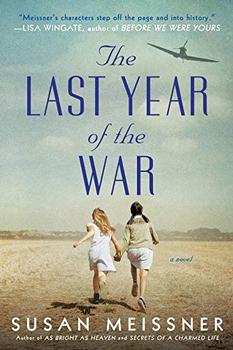Page 4 of 6
There are currently 37 member reviews
for The Last Year of the War
-
Janine S. (Wyoming, MI)
Another Susan Meissner winner!
Another Susan Meissner winner. This is the third book I've read by Ms. Meissner and she has yet to disappoint me. This is a gripping and heartfelt story of friendship in spite of differences and courage in the face of prejudice. I simply could not put this book down because I had to know how the story would end. The little known fact that Germans and other nationalities besides Japanese were interned was surprising but that repatriation was was part of the process was saddening. While the book is based on historical facts, it also has parallels to today so it can be read on another level. I highly recommend this book.
-
Kathleen B. (Las Vegas, NV)
Germany and Italy were a surprise
Elise was a typical 14 year old teenager in 1943 in Iowa. Then her father, a legal citizen for close to 20 yrs but originally from Germany, was arrested. The charges were suspicion of being a Nazi sympathizer. The family is sent to an interment camp in Texas. Elisa meets Mariko, a Japanese American from Los Angeles, CA and they become friends. They talk of the day when they will be set free and if they can rise above prejudice and hate and reclaim there own destines. After 60 years of not seeing Mariko, Elise wants to see her before she succumbs to her Alzheimer's disease. Anymore and I have given away the whole book. I think this would be an excellent book club read.
-
Patti P. (Phoenix, AZ)
Mixed emotions
This one was a tough one for me to review. Not quite 4 stars, but definitely better than 3. I absolutely loved the budding friendship between the two girls (both residents of USA internment camps during WW II, one a German-American and one a Japanese-American), but I found there were sections of the book where I felt the author was trying too hard to give the reader "too much". Overall, it was a quick and enjoyable read, but I've also read quite a few historical fiction books during WWII that were better. Fun fact that I learned was about the fact that Our United States sordid past during the internment Years also included German Americans along with the Japanese - as this I did not know. Despite my mixed emotions, I am thoroughly grateful to the publisher to provide me this ARC - due out March 2019.
-
Susan P. (Boston, MA)
The Last Year of the War
A moving story about an American-born teenager with German-born parents during WWII. She and her family were interred during the war at a camp in Texas where she meets a American-born Japanese teenager also interred there. They become fast friends and are separated when both families are returned to their parents' native countries. The historical aspects are fascinating and heart-breaking. Many decades later, the German girl (having lived in the US for decades) searches for her friend. What happens in between in compelling and very readable. For anyone who enjoys good historical fiction -- especially one about friendship.
-
Barbara C. (Hamburg, NY)
Highly readable and educational too!
Susan Meissner's latest (3/19) historical novel explores the life long impact of U.S. internment camps on two American teenage girls with German and Japanese parents. Easily accessible, well written characters and a subject I found interesting and enlightening made for an enjoyable read. The story moves between present day and 1945/46 as Elise tells the story of her friendship with Mariko and her search for the meaning of "home". Thanks to BookBrowse for the ARC and a chance to provide a review.
-
Lori H. (Puyallup, WA)
Everlasting friendship
This is a lovely story of friendship beginning during WWII and ending when the two main characters are in their 80s. This is also a story of internment and repatriation and family bonds. Susan Meissner highlights an overlooked period in American history with skill. A fine historical pick for any book club.
-
Henry W. (Lake Barrington, IL)
Unbelievable ending
Two thirds, a really good read. The contrast between the two main characters was well done. The role that previous life experiences had in their development was evident. Their experience in the internment camp was different as a result. The contrast between naïveté and street smart was obvious. The extent of the prejudice that would likely have been experienced upon repatriation was understated. For the last third of the book too many serendipitous events take place to produce a happy ending. One wonders what would have happened if Mariko continued to have an influence on Elsie. It was interesting to learn about the German internments as well as the prisoner exchanges and forced repatriation. The entire episode from the internment to the repatriation reminds us of the importance of constitutional protection.
